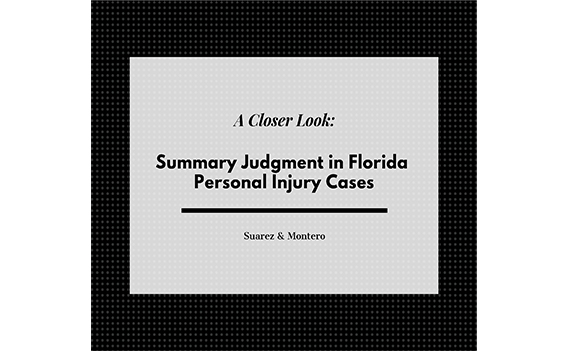
A Closer Look: Summary Judgment in Florida Personal Injury Cases
Frequently, during the litigation process, one or both of the parties involved will attempt to use a procedural device known as the motion for summary judgment to dismiss certain issues from the case. Summary judgment is a stage in many Florida personal injury cases in which one or both parties ask the judge to rule in their favor prior to trial. The purpose of a summary judgment is to avoid the expense and delay of trial when no dispute exists concerning the material facts. The question for determination on a motion for summary judgment is the existence or nonexistence of a material factual issue.
Procedure
The claimant cannot file a summary judgment motion within the first 20 days after filing the action. A party against whom a claim has been asserted may file a summary judgment motion at any time. If the defending party has filed and served a summary judgment motion within the first 20 days, the claimant may then also file a summary judgment motion. Also, the motion must specifically state the grounds upon which it is based and the substantial matters of law to be argued and must specifically identify any affidavits, answers to interrogatories, admissions, depositions, and other materials on which the movant relies. The movant must serve the motion at least 20 days before the time fixed for the hearing. Failing to respond to a motion for summary judgment can result in your case being dismissed or a judgment being entered against you.
In support of the motion for summary judgment, a party is allowed to use all of the information obtained during the discovery phase of the lawsuit, including, without limitation, deposition testimony, answers to interrogatories and answers to requests for production. The parties may also utilize affidavits from experts to support the motion or opposition to the motion for summary judgment. If the motion is granted, the judgment on the issue or case is deemed to be a final judgment from which a party may seek an appeal. The court of appeal can reverse the grant of summary judgment and reinstate the claim in the lower court. However, this is rarely done, and most summary judgments are upheld on appeal.
Standard
The legal standard imposed by most jurisdictions requires that in order for a summary judgment to be granted by the court, the party moving for summary judgment must demonstrate that there are “no genuine issues of material fact and that the moving party is entitled to judgment as a matter of law. There are two requisites for granting a summary judgment. First, there must be no genuine issue of material fact. Second, one of the parties must be entitled to judgment as a matter of law on the undisputed material facts. The first question is whether the record shows an absence of disputed material facts under the substantive law applicable to the action. If the first requisite is met, one of the parties must then be entitled to relief as a matter of law. This requisite brings substantive principles of law into play. If the material-fact issues are undisputed, one party or the other should be entitled to judgment.
What this means in laymen’s terms is that the facts are undisputed, and the judge should decide the case in that party’s favor. Note that either the defendant or plaintiff can file a summary judgment motion. A judge will grant a party’s motion for summary judgment only when there are no contested issues of fact and, after considering the uncontested evidence, the moving party is entitled to judgment as a matter of law. Essentially this means that after taking into account the uncontested evidence, the non-moving party would not be able to prevail at trial. As a result, when you are opposing a summary judgment motion, you do not have to show that you will win on the issue. You only have to show that a genuine issue of material fact exists. It is important to note that Florida courts view a motion for summary judgment in the light most favorable to the non-moving party, which means in a close case, the person moving for summary judgment will typically lose the motion.
Florida personal injury lawsuits may seem straightforward at first glance, but complex issues often arise. You still have options if your personal injury case is dismissed or if you lose on a motion for summary judgment. What those options are depend on the facts of your case. Make sure you consult with an experienced personal injury attorney.





